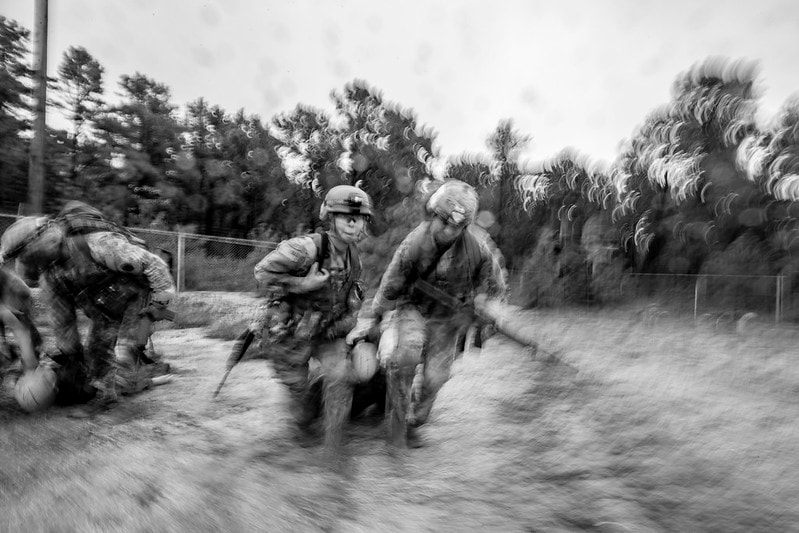 Back in mid-March as the Coronavirus pandemic began to ramp up and we still weren’t sure what was going to happen and hospitals filled for the first time, I got a text from Tom (not his real name), a combat veteran I counseled for a couple of years - months earlier, he had moved a few states away, and we hadn’t been in touch for a while. “You ok?” was Tom’s initial text. I texted back: “Doing fine, making necessary adjustments. Glad to hear from you.” “Just checking on my troops,” he replied. The exchange reminded me of the time Tom and I talked about the furniture arrangement in my counseling office: two chairs face each other, a door behind one chair and a window behind the other – not an easy choice for a combat veteran. He sat facing the door. I asked him why he let himself sit with his back to the window, and he said, “Because you’d tell me if anything was happening behind me, right?” Right. “I trust you,” he said gruffly. Another time, he spoke about his concern that the world might erupt in violence or anarchy. Like many combat veterans, the thought of domestic terrorism or mobs of angry, gun-toting civilians filled him with dread. “If anything like that happened, you’d let me protect you, right?” I told him I would. His eyes filled with tears. See, Tom was a combat medic who saw more horrific things in just a few days than most of us would encounter in twenty lifetimes. When I first started working with him, he stuttered uncontrollably any time he tried to talk about that one night in Fallujah. From the first time we met, I could see he was wounded and desperate - and a remarkably fine human being. Like many veterans I had worked with over the years, his sincere dedication to serving others was hard-wired into his way of life. Now, we were a couple of years down the road, and he didn’t stutter anymore. He laughed easily. He and his wife took the leap of moving to another state where they’d been hoping to retire for a long time. We're in touch from time to time, but the other day his text touched my heart. "Just checking on my troops." That right there. That's the kind of guy he is. Some bonds stay strong. "Why did you write this book?"
It sounds like such a simple question, yet every time a reader poses it my mind reels back to such rich memories of my earliest days on military bases: the shock of entering into a strange, powerful new culture, the reckoning over months and months and months, the mistakes and misunderstandings . . . and then the respect and dedication that rose up in me as I began to grasp their world. It was as if I went from having a foot-wide view of life to a view that was pushed wide open in all directions. I wanted others to have that same view-widening experience of coming to understand military service members, combat veterans and military spouses. I hoped readers’ lives would be enhanced by these remarkable stories. Here's how I spoke about it at a recent reading. 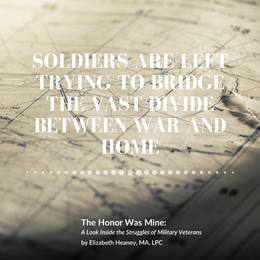 At last week’s reading of The Honor Was Mine*, several questions about PTSD surfaced: is it really a condition? Is it as rampant as new reports sometimes indicate? Can it be fixed? I’m always grateful for such beautifully engaged, thoughtful questions from an audience. They indicate a sincere concern for our combat veterans, and the stories in The Honor Was Mine are a perfect gateway to better insight and understanding. I prefer discussing PTSD through stories. It’s an “issue” – one that needs the attention of politicians, researchers, military higher-ups and civilians . . . and much better treatment and funding. But it’s also a deeply personal, idiosyncratic, seemingly-endless struggle for many combat veterans. In the book, I write about CPL Springer who hides in his closet because it’s the only place he feels safe. Ashamed and humiliated, he tells me about the day his father crawled into the closet and held him as they both sobbed. A female veteran trembles with unmanageable fear anytime she hears a fire truck siren on the streets near my office – the bomb attack that killed her friends started with a warning siren. Another veteran tells me the nightmares from Vietnam still wake him every single night, drenched in sweat and fighting panic. An Iraq veteran has to find the Wal-Mart exit quickly when the noisy, happy crowd fills him with racing dread. One Marine tells me when a car backfires and he’s on the living room floor in the fetal position, his wife’s voice telling him he’s ok sounds like she’s a million miles away, “She’s in Texas, and I’m in Kandahar . . .” Is PTSD a real thing? No question. And yes, I can help folks with PTSD. There are innumerable new treatments being developed, and more coming all the time. As we understand what happens to nervous system ravaged by combat, I think we’ll craft better and better responses and more healing options. The point-of-beginning for now is to keep fighting the stigma associated with PTSD so that everyone who suffers can bravely ask for help. There’s not a “weak” one among them, only decent human beings responding to the crushing experiences of combat. * shout out to Steve, Brian and everyone at Scuppernong Books in Greensboro! #PTSD #Scuppernong #combatvets 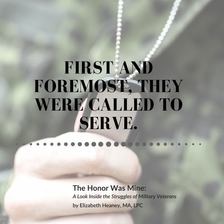 I’m inviting veterans to send a one-sentence remembrance of a warrior buddy or friend who was killed in combat. The tribute will be used as part of a Memorial Day project honoring those we’ve lost on the battlefield which will then be submitted to national publications. Below are the guidelines for your tributes: * Submit a one-sentence tribute honoring the friend you lost in combat. * Use only their first name or nickname. * Send your remembrance to: rememberthem2017@gmail.com by March 7, 2017. * Tributes will be used in longer essays and may also be used for YouTube scroll of remembrance and/or Facebook page remembrance (also entitled “Remember Them 2017”) – you will be notified of these projects. * Your tribute will remain anonymous. Think of this as an opportunity to say what you wish about your friend – give us a sense of who they were or what made the friendship so important or the thing you will always remember about them and/or how much they meant to you. Your sentence could be humorous or poignant, deeply heartfelt or raucous . . . whatever speaks to the bond you had. * Your submission may be edited slightly for grammar or readability, but I’ll strive to preserve the aim of the tribute. Thank you so much, Elizabeth Heaney Author, The Honor Was Mine: A Look Inside the Struggles of Military Veterans. www.elizabethheaney.com FB: Elizabeth Heaney, Author EXAMPLES:
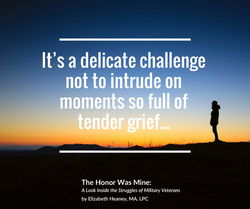 From the first day of writing, my deepest wish was that The Honor Was Mine would speak right across the military-civilian divide. Last week, at Malaprop's, Asheville's premier independent bookstore, I got to see first-hand the responses on both sides of that sometimes-vast divide. A veteran waiting to get his book signed thanked me for writing it with tears in his eyes. A civilian friend sent me this note: This book opened my eyes and my heart to the courage and struggles of the millions of soldiers, veterans and military families who are sometimes invisible in our midst. Another veteran gazed silently, but his eyes told me everything - he was engaged, present, nodding his head in appreciation of the discussion that was taking place. A couple of friends who were sixties-era hippie anti-war demonstrators told me the book changed their perception of the military. A veteran who's reading it now tells me he feels like he's back on the base - in a good way. He laughs at the familiar slang and well-remembers some of the tight-clipped atmosphere of military life. And it helps him remember his buddies, fallen in combat. A civilian reader wrote a powerful response: If enough of us read it, The Honor Was Mine can help us stop the shocking suicides of thousands of active and retired service members each year arising from the lingering pain of these experiences. I'm so grateful to each and every reader (and listener). I do hope the book changes hearts. I'd like to hear if it changed yours . . . I'd like to share some of the early response to The Honor Was Mine - out just a few days now, the reactions from early readers have been heartwarming: "Your sensitivity and description of your interactions with the soldiers is so vivid, so visual, and all the nuances that you picked up in their body language and in their words is very touching and heart-rending." "Have just finished reading your book. WOW! Such amazing writing and incredible insight into soldiers and their families. Also into the incredible job expectations you experienced. I hope you are very proud of this work, as you should be." "What an insightful and delicately written book. The honor may have been hers, but the gratitude is ours." I hope you'll read it and let me know what you thought, felt and learning in hearing the stories the combat veterans, spouses and loved ones had to share! 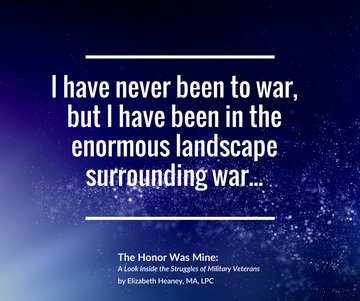 Here's a quote from The Honor Was Mine that speaks to the landscape surrounding war. Since I no longer work on military bases, you might think I'm no longer connected to that landscape - but you'd be wrong. I visit that devastating landscape week after week with the combat veterans I still work with . . . I have never been to war, but I have been in the enormous landscape surrounding war, with soldiers who were boarding planes carrying them into wild chaos, with spouses who were shuddering with fear about who would come home tomorrow—a dreadful, bruised stranger or the sweetheart they’ve been missing. I wrote my first story like this: Sitting in my hotel room at the end of a very long day, I pulled out my laptop and opened it to a stark blank page. My heart felt tattered with everything I’d seen and heard, so I sat in the soft glow of the desk lamp, writing about a battalion’s grief as they learned one of their soldiers had been killed in combat. There were no hardened warriors that day, just men and women who felt their loss with a raw, stunned vulnerability. I wrote to make room for the next day, which promised to hold more grief-stricken conversations. You can read so much more when the book comes out, Sept. 6. The stories combat veterans tell will change your heart . . . Proud to share the front cover of this amazing book that’s being released on Sept. 6! (Available now for pre-order at Amazon.com) And below the image, some of the copy from the back cover. Such a remarkable journey, made possible by the thousands of military service members and veterans who shared their lives and their stories with me . . . A young combat veteran hides in his closet under a pile of clothes on bad days. Another, home for five days after a year of solitary work, can’t figure out how to talk to his wife. A commander’s spouse recounts the soul-draining effect of attending ninety-three memorial services . . . When therapist Elizabeth Heaney left her private practice to counsel military service members and their spouses, she came face-to-face with unheard-of struggles and fears. The Honor Was Mine reveals the emotions running deeply—and often silently—in the hearts of combat veterans and their loved ones. For those unconnected to the military, this is an eye-opening portrait of the complex, nuanced lives of service personnel, who return from battling the enemy only to grapple with the fallout of war—all while readjusting to civilian life. Presenting the soldiers’ stories—told in their own words—as well as her own story of change, Heaney offers readers an intimate perspective, not of war itself but of its emotional aftermath. Some of these stories scrape the bone; others are hopeful, even comical. Every one reveals the sacrifices of those on the front lines and the courage, grace, and honor with which they serve and struggle to truly come home. Previous Comments:danny johnson says:
Bob Rosen says:

Just watched an astoundingly poignant 60 Minutes episode on Gold Star Parents, those who have lost a son or daughter to combat. It’s the kind of thing we all need to watch in order to understand the isolating loss they each carry in their hearts, the grief they face, the unique experience they walk through.
You can watch it below or here. Let me know what you think. Better yet, let me know what you felt . . . Previous Comments:Bob says:  Last month I had the opportunity to offer a couple of writing workshops at the second annual Military Experience and the Arts conference in Lawton, Oklahoma. I’d like to give you a sense of what those workshops were like because I left there with such a full heart. The group included men and women, combat veterans (from Korea, Vietnam, the First Gulf War, Iraq and Afghanistan), military spouses and a few people who grew up in military families. We met in a classroom at Cameron University, gathering around the tables that served as desks with blank white-boards covering the walls around us. For the most part, the attendees didn’t know each other; most of them would say they weren’t writers. They showed up to see what it would be like to write about the things their hearts still carried from many years in the military: friends lost, months – or years – in combat, the huge chasm between them and the civilian world, the sense of pride and service they wore along with those uniforms. We wrote from prompts (noise, uniform, leaving, everything changed when…), writing for just a few minutes as a quick warm-up. When we stopped writing, anyone who wanted to could read their piece of writing to the group, and then (the part they all loved the best) the group would echo back to the writer the words and phrases that stood out to us in their piece. Random words and phrases floated back to the writer: “forever gone” . . . “I wanted home” . . . “never been more scared” . . . “mortar’s scream, then black silence.” We wrote longer pieces, too – up to twenty minutes on the more complex prompts. And then the echo back part would happen again. These veterans and spouses and family members wrote poetry or prose, fiction or non-fiction, or maybe a list of words that came to mind. I can still see them, hunched over those ugly-but-functional classroom tables, furrowed brows, pens scratching on paper, sighs floating through the air as they wrote. Sometimes one of them would stare off into space for a brief moment, trying to capture the flash of memory pressing up from inside: the remembrance of sound or silence; the smell of mud and blood; the goodbyes they never got to speak; the days leading to leaving, the nights waiting to go home. These were their rules of engagement: just keep writing, don’t think too much, don’t edit, don’t need it to make sense, write anything that comes to mind or heart. Reading their pieces, their voices became choked with emotion. The room turned pristinely quiet and attentive, a cocoon holding this tribe of warriors. They read about the buddy they’ll never forget, the pressure of saying goodbye to loved ones for yet another long year of combat, the taut laces of fear that stitched together moments of fighting. One after another overcame their hesitancy to offer what they wrote; one after another had to pause. We all waited patiently for the reader to regain enough composure to read the next sentences. Sometimes there was more than one pause to stave off the tears that were brimming. The room kept getting more and more intimate, more and more attuned to the words being read, more and more holy. Afterward, some of the group told me they had never written like this before – or had never written about that moment, about that friend or that heartbreak. As everyone lingered and talked around those scattered tables, I knew bonds had been formed, in between the words and the silent receiving of them. Out there on the wide plains of Oklahoma, men and women were finding their way home, word by beautiful word. danny johnson says:
|
Elizabeth Heaney - AuthorClinical Psychologist, teacher, private counselor. She speaks and writes about her work with service members. Archives
November 2020
Categories
All
|
|
All content (C) Elizabeth Heaney except where noted. All rights reserved, 2016.
Web design by GraphicMedia Design
|
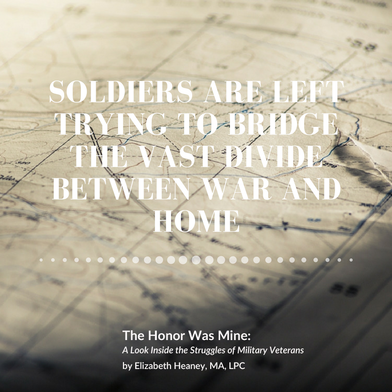
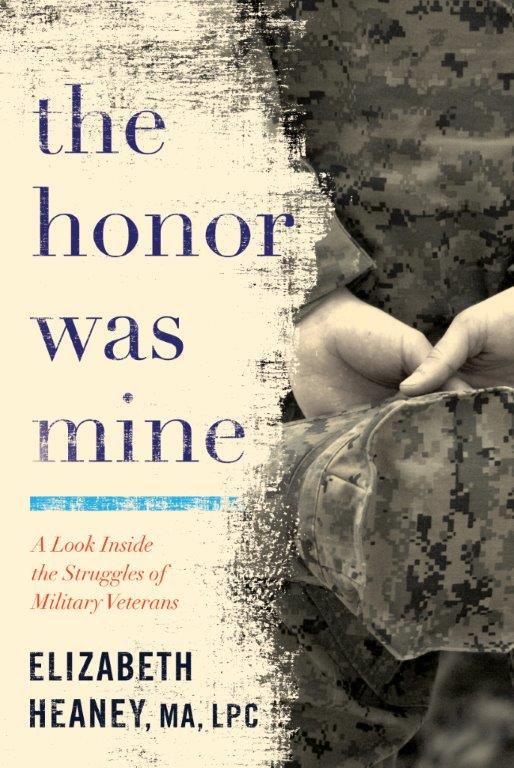
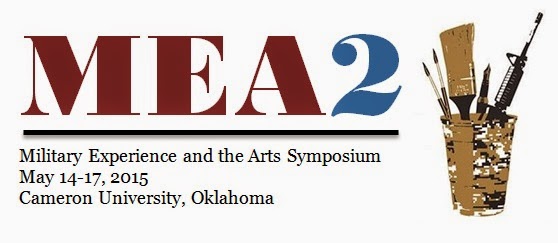
 RSS Feed
RSS Feed